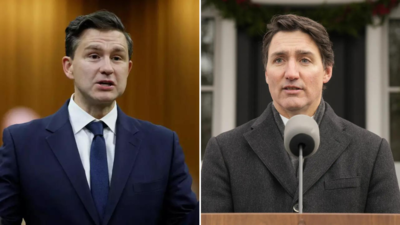With Justin Trudeau stepping down as Canada’s Prime Minister, Conservative Leader Pierre Poilievre emerges as the frontrunner for the country’s top political role. Poilievre’s sharp criticism of Trudeau’s immigration policies and his pledges to overhaul Canada’s immigration system have become pivotal to his political platform.
In December 2024, Poilievre made his position clear, telling reporters on Parliament Hill, “The radical, out-of-control NDP-Liberal government has destroyed our system. We have to have a smaller population growth.” He expressed frustration over what he perceives as Trudeau’s mishandling of immigration, stating that, under the current government, “immigration was not even a controversial issue” until Trudeau took office.
Poilievre further argued that the surge in international students and low-wage temporary foreign workers had disrupted what he called a “multigenerational consensus” around immigration being a positive force for the country. “We have to have a smaller population growth,” he stressed, calling for a drastic change in immigration policy.
The Conservative leader has proposed that a future Conservative government would tie population growth to the availability of housing, healthcare, and jobs. “We will link the number of people coming into this country with the number of homes, the amount of health care, and the availability of jobs,” he said. Poilievre’s proposed approach would effectively cap immigration rates, ensuring they do not exceed the country’s capacity to provide for newcomers.
He has also vowed to address what he sees as abuses within the temporary foreign worker and international student programs, pledging that his government would “block temporary foreign workers where they are taking jobs from Canadians.”
Poilievre has been particularly critical of Trudeau’s handling of the Temporary Foreign Worker (TFW) program, which he believes has been undermined by lax regulations. He added that the government’s decision to remove restrictions on foreign workers in sectors with low unemployment had caused lasting damage. “The government has destroyed the TFW program,” Poilievre said. “I will preserve the program for the agricultural sector, but I want to block temporary foreign workers where they are taking jobs from Canadians.”
Trudeau revealed that “internal battles” had led him to conclude that he could “not be the best option” for leading the country into the next election. Trudeau expressed concern over the divisive politics of immigration, acknowledging that the country’s policies had become strained. However, Poilievre wasted no time seizing on what he sees as Trudeau’s failure to properly manage immigration.
Trudeau’s decision to scale back immigration levels in response to the current housing and job shortages has come too late for many of his critics, including Poilievre, who claims the damage is already done. He said, “Trudeau’s last minute pre-election reversal cannot be believed. He can’t fix the immigration system that he broke.” Poilievre also criticised Trudeau for what he perceives as irresponsible decisions, such as removing the visa requirement for Mexico and failing to close the Roxham Road border crossing when President Biden offered to do so. “He allowed rampant fraud and abuse in the international student program,” Poilievre argued, referencing the troubling stories of overcrowded living conditions for some international students.
The resignation of Trudeau has opened the door for a leadership contest within the Liberal Party, but Poilievre’s promises on immigration are likely to remain a major issue in the upcoming election. While Poilievre has promised to restore what he views as Canada’s once-effective immigration system, he has also pledged to ensure it is better managed in the future. “We will stop the illegal arrival of false refugee claimants by securing our borders, our ports and our airports,” Poilievre said.




